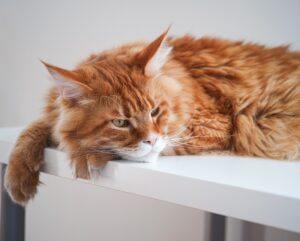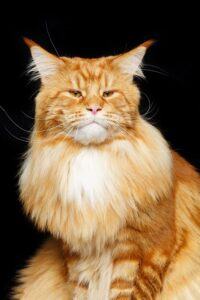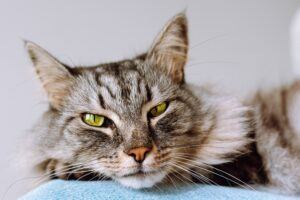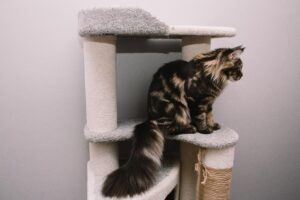Its been a while since we brought you our first guide to proper discipline of a Maine Coon Cat. We understand the confusion of seeing such docile cats misbehave…or are they?
Below we’re going to give you some more tips and insights on How To Discipline A Maine Coon Cat as well as some additional strategies you can incorporate into your cat’s care plan.
Before we get into it, we want to thank each of you for your questions on our first post. If you missed it, you can click here to read our 5 Fool-Proof Ways To Discipline A Maine Coon Cat it then come back and continue this post. Or you can read this one first, its up to you.
Also we want to thank you for continuing to love you cat through these trying times. It is our goal to give you as much assistance as possible in order to create a happy space for you and your cat(s).
That being said, if at any time you have any questions or other concerns, please respectfully engage in the comments. Go ahead and read through the comments as well to see our responses to other community member concerns.
The animal shelter should never be anyone’s first option. We want to help you avoid it as much as possible. Some of the simplest techniques can make the biggest impact.
Now without further delay, lets get into the meat of why you came here. Because we understand that time is of the essence, below you will find an outline of this article. Use it to skip around to areas that you found valuable but please do read through at least once to get the full scope of solving this issue.
How to Discipling a Maine Coon Cat? Important Concepts

Maine Coon cats are known for their large size, luxurious coats, friendly personalities, and intelligence. As beloved members of many households, these majestic felines require proper discipline to ensure a harmonious relationship between the cat and its human companions.
Discipline, in this context, refers to the techniques and approaches used to teach a Maine Coon cat desirable behaviors and boundaries. Unlike traditional disciplinary methods, which might involve punishment, disciplining a Maine Coon involves positive reinforcement, clear communication, and understanding the cat’s unique characteristics.
Understanding Maine Coon Cats
Before exploring specific disciplinary strategies, it is crucial to understand the nature and characteristics of Maine Coon cats.
These cats are known for their intelligence, social nature, and curiosity. They enjoy interacting with their human companions and are often referred to as “gentle giants” due to their friendly disposition and relatively large size.
Recognizing these traits is essential when devising a disciplinary approach that aligns with the cat’s natural tendencies.
What is Positive Reinforcement?
Positive reinforcement is a key component of disciplining any cat, including Maine Coons.
This approach involves rewarding desired behaviors with treats, affection, or playtime. Maine Coons are highly intelligent and can quickly associate actions with rewards.
For instance, if your Maine Coon uses its scratching post instead of the furniture, reward it with treats and praise. This positive feedback reinforces the cat’s understanding that the scratching post is the appropriate place to scratch.
Consistency is a fundamental aspect of effective discipline for Maine Coon cats. Cats thrive on routine and predictability.
If you establish rules and boundaries, it is essential to consistently enforce them. Mixed messages or irregular enforcement can confuse the cat and hinder the learning process.
For example, if you discourage the cat from jumping onto the kitchen counter, make sure everyone in the household follows the same rule.
How to Discipling a Maine Coon Cat By Redirecting Undesirable Behavior
Maine Coons, like all cats, may exhibit behaviors that are deemed undesirable in a household environment. Rather than scolding or punishing the cat, redirect their behavior to a more acceptable alternative.
For instance, if your Maine Coon is scratching the furniture, gently move it to the designated scratching post. Over time, the cat will associate the scratching post with the desired behavior.
Maine Coons are highly energetic and intelligent cats that require ample mental and physical stimulation. Engaging in interactive play sessions not only provides an outlet for their energy but also strengthens the bond between you and your feline companion.
Use toys that stimulate their hunting instincts, such as feather wands or puzzle feeders (we can give you some recommendations if that will help!). Regular play can help prevent behavioral issues that arise from boredom or excess energy.
Training Commands for Maine Coon Cats
You might think that commands are only for dogs but think again! Maine Coons can be trained to respond to simple commands, further enhancing their understanding of boundaries and expectations.
Start with basic commands like “sit” or “come,” and reward the cat for complying. Positive reinforcement, such as treats and praise, will reinforce their understanding of the command.
Remember to keep training sessions short and positive, as Maine Coons can become disinterested if sessions are too lengthy.
The Time-Out Approach to Training
Just like a child, in some cases, a time-out approach can be effective when dealing with unwanted behaviors. If your Maine Coon engages in behavior that you wish to discourage, such as aggressive play or excessive meowing, calmly and gently remove the cat from the situation and place it in a quiet, designated area for a short time.
This brief separation can help the cat associate the undesirable behavior with a temporary loss of attention.
Understanding and Addressing Scratching Behavior
We’ve got a whole article that talks about Why Cats Scratch, but to sum it up, scratching is a natural behavior for cats that serves to mark territory, sharpen claws, and stretch muscles.
Maine Coons, with their large size and strong claws, may engage in scratching more vigorously. Instead of attempting to eliminate scratching altogether, provide appropriate outlets for this behavior.
Offer scratching posts specifically designed to handle your Maine coon’s powerful claws that is made of materials that mimic tree bark or sisal, which are satisfying for cats to scratch.
Place the scratching posts near areas the cat frequents to encourage their use.
[otw_shortcode_button href=”https://catclimbingstructures.com/10-best-cat-trees-for-maine-coons/” size=”medium” icon_type=”general foundicon-right-arrow” icon_position=”left” shape=”radius” color_class=”otw-greenish” target=”_blank”]Click Here To See Our List of the 10 Best Cat Trees For Maine Coons[/otw_shortcode_button]
It’s important to remember that each Maine Coon cat has its own personality and preferences. Some cats may be more responsive to certain disciplinary methods than others.
Observing your cat’s reactions and adjusting your approach accordingly demonstrates respect for its individuality. Just as with human relationships, building trust and understanding takes time and effort.
Take Advantage of Maine Coon’s Social Nature When Addressing Unwanted Behavior
Maine Coon cats often seek companionship and interaction with their human families. This inherent trait can be used to your advantage when disciplining them.
Instead of isolating the cat as a form of punishment, consider using positive social interaction as a reward. When your Maine Coon exhibits good behavior, engage in playtime, gentle petting, or even verbal praise.
This approach not only reinforces the desired behavior but also strengthens the bond between you and your furry friend.
These cats also thrive in environments that offer mental and sensory stimulation. Environmental enrichment can help prevent behavioral issues and provide an effective means of discipline.
Consider incorporating climbing structures, hiding spots, and interactive toys into your cat’s environment. Puzzle feeders and treat-dispensing toys engage their natural instincts and provide mental challenges, diverting their attention from potential trouble.
Addressing Aggression In Maine Coon Cats
Aggressive behavior, whether directed towards humans or other animals, should be addressed promptly but without resorting to punishment. Aggression in Maine Coons can be triggered by stress, fear, or territorial instincts.
To discipline against aggressive behavior, identify and eliminate stressors whenever possible. Gradually expose your cat to new experiences, people, or animals, allowing them to acclimate at their own pace.
If aggression persists, consult a veterinarian or a professional animal behaviorist for guidance.
How to Discipling a Maine Coon Cat’s Excessive Vocalization
Maine Coons are known for their distinctive, melodious voices. While their vocalizations can be endearing, excessive meowing can sometimes become a nuisance.
To discipline against this behavior, first, rule out any medical issues that could be causing discomfort. If there are no underlying health concerns, address the behavior through positive reinforcement.
When your Maine Coon remains quiet during times when it might typically be vocal, offer treats and affection to encourage the silence. However, remember that some vocalization is natural and a part of your cat’s communication.
I know we’ve mentioned it before but we need to make this point clear especially if you’re skipping around the article, which is fine, we just don’t want you to miss this. It’s essential to avoid using punishment or negative reinforcement when disciplining Maine Coon cats.
These methods not only damage the trust and bond you share with your cat but also tend to be ineffective. Cats don’t respond well to punishment, and it may lead to fear or stress-related behaviors.
Yelling, hitting, or any form of intimidation can harm your relationship and even exacerbate behavioral issues. Instead, focus on teaching your Maine Coon what behaviors you want to see through positive means.
Seeking Professional Guidance
If you find yourself struggling to discipline your Maine Coon or manage its behavior, don’t hesitate to seek professional guidance. Veterinarians, animal behaviorists, and experienced cat trainers can provide valuable insights tailored to your cat’s unique personality and circumstances.
These experts can help you develop a personalized plan to address specific behavioral challenges, ensuring that both you and your Maine Coon are on the path to a harmonious coexistence.
5 Strategies You Can Start Today To Help With Your Cat’s Aggression
1. Maintaining a Healthy Routine
In addition to the behavioral aspects, maintaining a healthy routine is crucial for disciplining Maine Coon cats effectively. Cats, including Maine Coons, thrive on routine and predictability.
Set a consistent schedule for feeding, playtime, and rest. When these elements are in place, your Maine Coon will feel more secure, reducing the likelihood of stress-related behavioral issues.
2. Creating Safe Spaces for Your Cat
Maine Coon cats value their personal space. Provide hiding spots or cozy areas where your cat can retreat to when it feels overwhelmed or simply needs some alone time.
These safe spaces are particularly essential in multi-pet households or when there are changes in the environment. When your cat has access to these safe havens, it can effectively manage its stress and anxiety, leading to better behavior overall.
[otw_shortcode_button href=”https://catclimbingstructures.com/the-best-cat-condos-for-large-cats/” size=”medium” icon_type=”general foundicon-right-arrow” icon_position=”left” shape=”radius” color_class=”otw-greenish” target=”_blank”]Click Here To See Our 10 Best Cat Condos for Large Cats![/otw_shortcode_button]
3. Monitoring Your Cat’s Health and Well-being

A well-disciplined Maine Coon cat is also a healthy cat. Regular veterinary check-ups are crucial for identifying and addressing any health issues that might contribute to undesirable behavior.
Behavioral changes can often be indicative of underlying medical conditions. By ensuring your cat’s physical well-being, you’re setting the foundation for a well-behaved and contented feline companion.
4. Understanding That This Is A Lifelong Process of Learning and Adaptation
Disciplining a Maine Coon cat is an ongoing process that requires adaptability and learning. As your cat grows older, its needs and behaviors may change.
Remain open to learning about your cat’s evolving preferences and requirements. Just as you would in any relationship, adapt your approach as needed to accommodate your Maine Coon’s changing lifestyle.
5. Fostering Mutual Respect Towards Your Feline Companion
Ultimately, the key to successful discipline lies in fostering mutual respect between you and your Maine Coon. Rather than imposing your will, seek to understand your cat’s perspective and communicate your expectations clearly.
Just as you’re teaching your cat, your cat is also teaching you about its personality and preferences. As you practice patience, consistency, and positive reinforcement, you’re building a strong foundation of trust and respect that will underpin your relationship for years to come.
How To Incorporating Enrichment With Cat Trees
An important aspect of disciplining Maine Coon cats is providing them with appropriate outlets for their natural behaviors. One highly effective and practical addition to your home that can greatly contribute to your Maine Coon’s well-being and discipline is a cat tree.
Understanding the Appeal of Cat Trees to Cats
We have written an article addressing cats needs like climbing & scratching. Click Here to Learn More About Why Cats Like To Climb but below you will find a quick summary for your information
Cat trees are multi-level structures designed specifically for feline enrichment. They often feature scratching posts, perches, hiding spots, and sometimes even hanging toys.
These structures cater to a Maine Coon’s innate instincts, offering them a space to climb, scratch, observe, and rest. Given the Maine Coon’s love for heights and its inquisitive nature, a cat tree can quickly become a cherished part of their environment.
5 Benefits of Cat Trees in Discipline

- Scratching Outlet: Maine Coons have a strong scratching instinct, and cat trees equipped with scratching posts provide an appropriate place for them to satisfy this behavior. By offering a designated scratching area, you’re effectively redirecting the cat’s natural tendency away from furniture and other undesirable surfaces.
- Climbing and Exercise: Maine Coons are skilled climbers and enjoy being in elevated positions. Cat trees provide various levels and platforms for them to explore, climb, and jump. This type of physical activity helps them burn energy and maintain a healthy weight, contributing to their overall well-being.
- Territory Marking: Cats have a territorial nature, and having a cat tree can serve as a “territorial marker” for your Maine Coon. They can scratch, rub, and explore the various parts of the tree, which helps create a sense of ownership and comfort in their living space.
- Observation Point: Cat trees offer an excellent vantage point for your Maine Coon to observe its surroundings. Cats are naturally curious, and having a place from which they can watch the world around them can be stimulating and satisfying.
- Resting and Privacy: Cat trees often include cozy platforms or hiding spots where your Maine Coon can retreat for rest and solitude. Having a space that’s exclusively theirs can be particularly useful in managing stress and promoting calm behavior.
Choosing the Right Cat Tree for Maine Coon Cats
(Click Here to See The Best Cat Trees for Maine Coon Cats on YouTube & Please Subscribe to Our Channel for more cat relatable content!)
We have previously covered this topic extensively so we will link more resources for you in this section. Feel free to use them to create an action plan in addition to helping you find The Best Cat Tree for Your Maine Coon Cat.
When selecting a cat tree for your Maine Coon, consider its size, sturdiness, and the features it offers. Given the Maine Coon’s larger size, look for a tree with sturdy materials that can support their weight.
Multi-level options with a variety of surfaces, such as carpet, sisal, and wood, can cater to different aspects of your cat’s behavior.
Incorporating the Cat Tree into Your Home
To maximize the benefits of the cat tree, strategically place it in a location where your Maine Coon spends a lot of time. Ideally, position it near a window where your cat can enjoy watching birds or other outdoor activities.
Placing it in a communal area ensures that your cat can engage with family members while perched on its tree.
Cat Tree Resources for Maine Coon Cats
- 10 Best Cat Condos for Large Cats
- 10 Best Cat Trees For Large Cats [Full Reviews]
- The Best Sturdy Cat Tree for Large Cats [Your Cat Needs This]
Informative Articles
- How To Get A Cat To Use A Scratching Post If It Refuses To
- How To Choose The Best Cat Climbing Structures [For ALL Cats]
- Why Do Cats Scratch Carpet And Furniture?
Adding a cat tree to your home is not just a decorative choice but a purposeful investment in your Maine Coon’s well-being and discipline.
By understanding and catering to their natural instincts for scratching, climbing, and observing, you’re offering them a space where they can thrive both physically and mentally.
A cat tree complements the other positive discipline strategies discussed earlier, providing your Maine Coon with a holistic environment that encourages appropriate behavior and fosters a harmonious bond between you and your feline friend.
And remember, disciplining a Maine Coon cat is not about imposing dominance or control, but about cultivating a loving and respectful relationship based on trust, understanding, and positive reinforcement.
By acknowledging the cat’s innate traits, such as its intelligence, social nature, and unique personality, you can tailor your approach to effectively guide its behavior.
Also, remember that discipline is a two-way street – you’re both learning from each other, growing together, and adapting to each other’s needs. Through this journey of patience and empathy, you’ll develop a deep and rewarding connection with your Maine Coon that will bring joy and companionship to both your lives.
I hope this article was helpful. If you have any questions, comments or other feedback, please leave them in the comments box below.
Just in case you missed it, click the button below to see our 10 Top Recommendations for Cat Trees for Maine Coon Cats.
See you next time!
[otw_shortcode_button href=”https://catclimbingstructures.com/10-best-cat-trees-for-maine-coons/” size=”medium” icon_type=”general foundicon-right-arrow” icon_position=”left” shape=”radius” color_class=”otw-greenish” target=”_blank”]Click Here To See Our List of the 10 Best Cat Trees For Maine Coons[/otw_shortcode_button]
Their friendly personality is what endears me to the Maine cat. They are such intelligent and wonderful creatures to be with. But when trained, you will appreciate their intelligence.
I like your emphasis on the need to gently move them to the desired scratching post. Having them scratch your chairs and luxurious tables can be annoying.
But we must learn to correct them gently and with love.
Hey there,
Thanks for your comment and sharing your thoughts. Yes its important to be gentle when correcting our Maine Coons and any animal really. I’m glad you enjoyed this Guide on How To Discipline A Maine Coon Cat.
Please remember to share it with anyone who might find value in this,
The Cat Climbing Structures Team
Hey there,
This is a lovely post. Thank you for taking the time to lay out these methods of training this breed of cats.
The pictures you have used are gorgeous, really showing off the ears of these cats. That’s their distinct trademark, isn’t it?
The use of Cat trees, as you have explained seems to offer far more than just somewhere to lay, I always thoughts these were just scratching posts, but you’ve explained that they bring so much more to these cats.
Really informative and I feel I learned a lot about this breed and the ways to get the very best out of them.
Thanks for your informative post.
Hey Chezstar!
Thanks for sharing your thoughts. We’re glad you found value and learned from this article.
Please share with anyone who might find value in this as well.
Take care,
The Cat Climbing Structures Team
Hi, there!
I couldn’t wait to read this article as I have a Maine Coon.
They definitely have their very own personality and I find that they are the most enjoyable cat breed!
I learned a few things from reading your article and never even thought to train my cat. He is indeed very vocal, especially when he wants his treats, but usually isn’t very mischievous.
I really enjoyed your content 🙂
Hey Steph,
Thanks for your comment! We’re glad you found value in it and thank you for sharing about your wonderful Maine Coon Cat, he sounds wonderful!
Yeah, they definitely have their own personality. Thats so important to remember because its so easy to get caught up in comparisons.
Each cat will be different.
We hope you have a safe and blessed week,
The Cat Climbing Structures Team
Hi!
I love how you say discipline is a two-way street. It so totally is. I’m sick and tired of the attitude that the human is the center of the universe and all of creation exists to serve us.
I’m always happy when I come across somebody nice like you who knows better.
I also like how you say this is a life long process. It’s no different with us. We learn, grow and adapt our whole lives…or at least we should…so it’s no different with our non-human companions. And it’s also no different in regards to the quality of our relationships with them.
I’ve never had a Maine Coon cat, but have always admired them. They’re so wild looking with those ear tufts and big, lion-like faces. After reading this, I REALLY want Maine Coons in my life at some point.
The idea of disciplining a CAT seems impossible. But after reading this, I can see how their high intelligence level actually would make it very possible.
I love how you stress positive reinforcement and cultivating a mutually respectful relationship. That’s so important. Because what other point is there to even HAVING non-human companions in our lives if we can’t be the best of friends?
Thanks so much for writing this. I learned a lot.
Anna
Hey Anna,
I’m glad you enjoyed this information about Disciplining A Maine Coon Cat. Yes, it is important for us to maintain mutual respect between animal/pet & people.
Please do share this with anyone who might find value in it.
Take care,
Marlinda
Ok, now I wonder if the worlds biggest cat is Maine Coon? It’s grey I believe, if that matters?
I grew up with cats. We had a farm, so cats just seemed to be a natural occurrence. I can agree that happy cats made through positive reinforcement are much better behaved than cats that get scolded all the time.
I have never heard of a puzzle feeder. Definitely going to research that more.
Thank you for this article. There was more information than I was looking for, so way to over deliver ?
Hey there,
I’m glad you found value in this information. Yes, we wanted to be sure to provide an in-depth guide since this is one of our community’s biggest issues.
Yes it is so important that our cats in general have good experiences from babies on up. I’m glad you were able to grow up with good knowledge as well.
Yes the World Record holder for longest cat is a Maine Coon, however the World Record holder for tallest domestic cat is a Savannah. Interesting that both are grey! 🙂
Thanks for your comment and questions,
Marlinda
I love reading your article on the Maine Coon Cat, so much useful information!
My cat is just like the very first picture you have at the heading.
I am not very clued in on names of the different color patterns of cats, but that cat could be mine! I think they are tortoiseshells, and these cats all look the same around our neighborhood!
The cat trees are awesome, and never thought of investing in one of these, as our cat goes into the garden a lot & she enjoys climbing and hiding under or in the bushes.
I suppose a cat tree works more for those who live in flats, or tower blocks, where it will offer the cat an opportunity to climb up high and make it their own.
Also when you mention disciplining the cat could almost be like a younger member of your family, learning a way to communicate and gain respect and find different ways to reward them where you get positive behaviour!
Great information, useful, and you show an excellent range of these cat trees.
Thanks for sharing this purrrrrfect information. keep up the good work.
Julia.?
Hey Julia!
Thanks for leaving this lovely comment and sharing your experience with cats.
Yeah, cats can look alike a lot especially when they’re in the same area.
I like how you said that cats are like a younger sibling of the household and that is such a good way to look at it.
We’re glad you found this article enjoyable and helpful. If at any time you need any assistance please let us know.
If you’re interested to learn more about cat climbing habits, we linked an article below for you to checkout. Just click the link to read more about it.
>>Click Here To Learn Why Do Cats Like To Climb
Take care and have a blessed day,
The Cat Climbing Structures Team
Thanks for sharing this information.
Although I do have a kitty I was not aware of Maine Coon cats.
You have given a very detailed explanation on how to manage their behavior effectively.
I do agree that this is a lifelong process. I appreciate these insights.
Hey Joseph,
Thanks for your comment. We’re glad you found value in it.
Take care,
Marlinda
I completely agree with the emphasis on positive reinforcement and clear communication when it comes to disciplining Maine Coon cats. As someone who has experienced the joys and challenges of living with these intelligent and sociable felines, I’ve found that rewarding positive behavior with treats and affection truly helps establish a harmonious relationship.
Redirecting undesirable behavior has been a successful strategy in my household as well. Instead of reprimanding, gently guiding them toward appropriate alternatives, like using designated scratching posts, has shown remarkable results over time. Interactive play sessions with stimulating toys have proven to be an effective outlet for their energy and a great way to strengthen our bond.
I’m interested in learning more about the specific toys you recommend to tap into their hunting instincts. How have these toys influenced their behavior and overall well-being in your experience?
Additionally, have you encountered any unique challenges when training Maine Coons that others should be aware of?
Your article offers valuable insights, reassuring me that discipline can be a positive and enriching aspect of our companionship with these amazing cats.
Hey Sean,
Thanks for leaving this lovely comment & for sharing your experiences with training, socializing and caring for Maine Coon cats.
Yes I will go into more details about specific toys that elicit the cats hunting instincts. It might be also helpful to know what to look for as being typical cat hunting behavior as we tend to assume human emotions to cat or any other animal behavior for that matter.
Please do look out for subsequent articles on these topics and more. We appreciate your kind care and consideration of your Maine coon Cat as well.
Keep in touch & feel free to ask more questions!
Pingback: Mokey
Glad you enjoyed it! 🙂